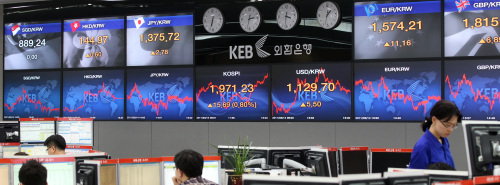But experts say prolonged disaster may pose threat to Korea’s exports, financial markets
The earthquake in Japan has caused minimal impact on South Korean firms and exports though damage will inevitably escalate should the Japanese economy take longer to recover than expected, the government said Monday.
The 9.0-magnitude temblor which occurred on the northeastern coast of the island nation Friday is feared to have dealt severe damage to the Japanese economy.
Korean firms operating in Japan do not seem to have been seriously damaged by the situation, the Ministry of Knowledge Economy said. Its exports are projected to receive limited impact from the incident, ministry officials said.
There are currently 272 South Korean firms operating in Japan, but only four of them have production facilities there, according to the state-run Korea Trade-Investment Promotion Agency.
“The amount of direct damages to companies is expected to be small as most of them only have office spaces, not production facilities in Japan,” KOTRA said.
Even those such as Lotte International and Jinro Japan located in Sendai region, which was hit hardest by the quake, managed to avoid harsh damage, and no deaths, according to the ministry.
Only POSCO, the nation’s largest steelmaker, in Osaka had minor loss at their production base, it added.
The disaster will not affect the country’s trade significantly either, the ministry said, as its exports to the northeastern region of Japan only account for 1.3 percent, or $317 million, of the Island country’s total imports as of 2009.
Korea’s exports to Japan soared 29.2 percent on-year to $28.2 billion in 2010 and jumped 57.4 percent on-year in January. Korea exports telecommunication devices and oil products while bringing in steel and metal from there.
Industry-wise, local producers of cars, semiconductors and liquid crystal display panels said that they expect the impact from Japan’s quake on their business to be minimal.
The quake’s impact will be more favorable than negative for Korean automakers, though such impacts will only be temporary until the operations of their Japanese rivals normalize, market observers said.
 |
Korea Exchange Bank workers monitor financial markets at a Seoul branch Monday. (Yonhap News) |
Japan’s top three automakers ― Toyota, Nissan and Honda ― halted operations of all their plants in Japan, mainly to evaluate damage from the quake last week and realign their distribution lines, according to the state-run Korea Trade-Investment Promotion Agency.
However, the country’s airlines and tour companies’ business is likely to be struck hard by the incident as Japan is their biggest market, analysts said.
Korean Air Lines, Korea’s top carrier, sales on its routes to Japan represented 15 percent of its overall sales last year, while those of No. 2 carrier Asiana Airlines Inc. accounted for 22 percent.
“As for Korean air carriers, the Korea-Japan route is the most lucrative one. An expected fall in passenger traffic on the route is forecast to hurt their earnings in the short term,” Park Eun-gyung, an analyst at Samsung Securities Co., said.
Seoul said it will closely monitor the situation ― including exchange rates and trade volume between the two countries ― as prolonged crisis may cause damage to Korea’s exports and production.
The country will take measures to help the country’s smaller exporters affected by the earthquake in Japan overcome their difficulties, state-run Small and Medium Business Administration said.
The agency will grant emergency financial aid of up to 220 billion won ($196 million) to smaller exporters, which will help them secure ample liquidity amid concerns that their exports to Japan may drop on production disruptions in the neighboring country.
Meanwhile, the local financial markets Monday managed to stay stable despite growing jitters over the impact of Japan’s devastating earthquake, industry experts said.
The benchmark Korea Composite Stock Price Index closed at 1,971.23 and the local currency traded at 1,129.70 won to the dollar, each up 0.8 percent and 5.50 won, respectively, from Friday.
“Our financial markets seem to have limited impact from the earthquake in Japan and we don’t see unusual foreign fund flows,” Min Sung-kee, director general of the financial market department at the Bank of Korea, said.
“But if the situation worsens and adds to the existing woes such as Middle East geopolitical unrest and European fiscal problems, our financial markets, especially equities, may suffer greater volatility,” he added.
By Koh Young-aah (
youngaah@heraldcorp.com)








![[Today’s K-pop] Blackpink’s Jennie, Lisa invited to Coachella as solo acts](http://res.heraldm.com/phpwas/restmb_idxmake.php?idx=644&simg=/content/image/2024/11/21/20241121050099_0.jpg)